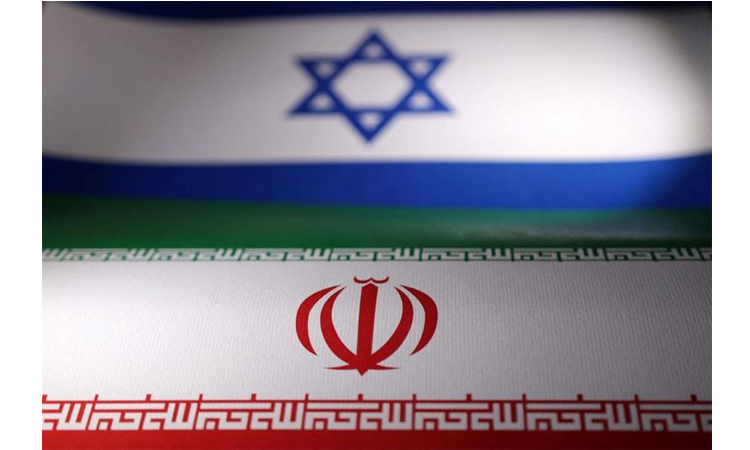News Flash

TEHRAN, June 13, 2025 (BSS/AFP) - Iran called Israel's wave of strikes on
Friday a declaration of war, while US President Donald Trump warned Tehran of
"even more brutal" attacks if it does not make a deal on its nuclear
programme.
Israel said its air strikes had killed most of the senior leadership of the
Revolutionary Guards' air force, while hitting about 100 targets including
nuclear facilities.
Iran's supreme leader Ayatollah Ali Khamenei warned Israel it faced a "bitter
and painful" fate over the attacks, while Foreign Minister Abbas Araghchi
described the attack as a "declaration of war".
The Israeli military said Iran launched around 100 drones, with air defences
intercepting them outside Israeli territory, while neighbouring Jordan said
it intercepted drones and missiles that violated its airspace.
Trump urged Iran on Friday to "make a deal", warning that there will be more
"death and destruction" after Israel launched deadly strikes targeting
Iranian nuclear facilities.
The United States underlined that it was not involved in the Israeli action
and warned Iran not to attack its personnel or interests, but Tehran said
Washington would be "responsible for consequences".
Prime Minister Benjamin Netanyahu said Israel struck at the "heart of Iran's
nuclear enrichment programme", taking aim at nuclear scientists and the main
uranium enrichment facility in Natanz.
The strikes would "continue as many days as it takes", the Israeli premier
said, while the military said intelligence showed Iran was approaching the
"point of no return" on its nuclear programme.
The strikes killed Iran's highest-ranking military officer, armed forces
chief of staff Mohammad Bagheri, and the head of the Revolutionary Guards,
Hossein Salami, Iranian media reported.
Khamenei swiftly appointed new commanders to replace those killed, while
state media said a senior adviser to the supreme leader had himself been
wounded.
"The senior chain of command of the air force of the Islamic Revolutionary
Guards Corps had assembled in an underground command centre to prepare for an
attack on the State of Israel," the Israeli military said, adding that its
attacks had killed most of them.
Iran confirmed the Guards aerospace commander had been killed, along with "a
group of brave and dedicated fighters".
Israeli Defence Minister Israel Katz said the "precise targeting of senior
commanders... sends a strong and clear message: those who work toward
Israel's destruction will be eliminated".
AFP images showed a gaping hole in the side of a Tehran residential building
that appeared to have sustained a targeted and localised strike.
State media said civilians, including women and children, were killed, while
an emergency services official said 95 people had been wounded.
Tasnim news agency said six nuclear scientists were among the dead.
- 'Scathing response' -
Tehran's streets were deserted except for queues at petrol stations, a
familiar sight in times of crisis.
"How much longer are we going to live in fear?" asked Ahmad Moadi, a 62-year-
old retiree.
"As an Iranian, I believe there must be an overwhelming response, a scathing
response."
Air traffic was halted at Tehran's main gateway, Imam Khomeini International
Airport, while Iraq, Jordan and Syria closed their airspace.
Israel declared a state of emergency, and hours later, the Jordanian military
said its aircraft and air defence systems intercepted "a number of missiles
and drones that entered Jordanian airspace".
There are "no limits in responding to this crime", Iran's armed forces said,
accusing Israel of crossing "all red lines".
Oil prices surged while stocks sank on the Israeli strikes, which came after
Trump's warning of a "massive conflict" in the region.
Trump had also said the United States was drawing down staff in the Middle
East, after Iran had threatened to target US military bases in the region if
conflict broke out.
Prior to the strikes, Trump said he believed a deal on Iran's nuclear
programme was "fairly close", cautioning however that an Israeli attack on
its arch foe could wreck the chances of an agreement.
The US leader did not disclose the details of a conversation with Netanyahu
on Monday, but said: "I don't want them going in, because I think it would
blow it."
Trump quickly added: "Might help it actually, but it also could blow it."
- 'Within reach' -
US Secretary of State Marco Rubio warned Iran not to respond to Israeli
strikes by hitting US bases, saying Washington was not involved.
With the violence raising questions on whether a sixth round of talks planned
between the US and Iran would still take place on Sunday in Oman, Trump said
Washington is still "hoping to get back to the negotiating table".
Confirming Natanz had been among Israel's targets, the UN nuclear watchdog,
the International Atomic Energy Agency (IAEA), said it was "closely
monitoring" the situation as the Israeli military said it hit the underground
uranium enrichment centrifuges at the site.
"Most of the damage is on the surface level," said the Iranian Atomic Energy
Organisation's spokesman Behrouz Kamalvandi, adding that there had been "no
casualties" at the facility.
- 'Extremist' -
Israel sees Iran as an existential threat, and Netanyahu has vowed less
restraint since the unprecedented October 7, 2023 attack by Tehran-backed
Hamas, which triggered the war in Gaza.
Since the Hamas attack, Iran and Israel have traded direct attacks for the
first time.
The United States and other Western governments have repeatedly accused Iran
of seeking a nuclear weapon, an ambition it has consistently denied.
Israel again called for global action after the IAEA accused Iran on Thursday
of non-compliance with its obligations.
Iran's nuclear chief, Mohammad Eslami, slammed the resolution as "extremist",
while Tehran said it would launch a new enrichment facility in a secure
location.
Iran currently enriches uranium to 60 percent, far above the 3.67-percent
limit set by a largely moribund 2015 agreement with major powers, but still
short of the 90 percent threshold needed for a nuclear warhead.